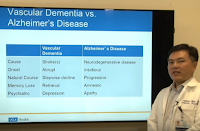VIDEO + ARTICLE:
Has the prevalence of dementia REALLY changed among older adults in the United States between 2000 and 2012?
JAMA Internal Medicine — Researchers reported a decline in the prevalence of dementia in the United States from 2000 to 2012, although all the factors contributing to this decline remain uncertain, according to an important article published online by JAMA Internal Medicine.
Continued below video…
The decline in memory and cognitive function in dementia that leads to a loss of independent function are common and dementia affects an estimated 4 to 5 million older adults in the United States every year. Some recent studies have suggested the age-specific risk of dementia may have declined in some high-income countries over the past few decades. Rising levels of education may have contributed to decreased dementia risk through multiple pathways, including a direct effect on brain development and function, as well as health behaviors. The intensity of treatment for cardiovascular risk factors, such as diabetes, hypertension and high cholesterol, also may have had an impact on decreased dementia risk.
Kenneth M. Langa, M.D., Ph.D., of the University of Michigan, Ann Arbor, and coauthors used data from the Health and Retirement Study, a large nationally representative group of U.S. adults to compare the prevalence of dementia in 2000 and 2012. The study included more than 21,000 adults 65 or older (10,546 adults in 2000 and 10,511 in 2012).
Dementia prevalence decreased from 11.6 percent in 2000 to 8.8 percent in 2012, which corresponds to an absolute decrease of 2.8 percentage points and a relative decrease of about 24 percent, according to the results.
Older adults in the 2012 group had, on average, about one year more education compared with those adults in the 2000 group. Improvements in treating cardiovascular risk factors also may have played some role in the decrease, the study concludes. The study also notes several limitations.
“However, the full set of social, behavioral and medical factors contributing to the decline in dementia prevalence is still uncertain. Continued monitoring of trends in dementia incidence and prevalence will be important for better gauging the full future societal impact of dementia as the number of older adults increases in the decades ahead, as well as clarifying potential protective and risk factors for cognitive decline,” the study concludes.
RELATED COMMENTARY:
- “Dementia Trends in the United States: Read Up and Weigh In,” by Ozioma C. Okonkwo, Ph.D., and Sanjay Asthana, M.D., of the University of Wisconsin School of Medicine and Public Health, Madison.
ORIGINAL INVESTIGATION:
- A Comparison of the Prevalence of Dementia in the United States in 2000 and 2012,
Kenneth M. Langa, MD, PhD1,2,3,4; Eric B. Larson, MD, MPH5; Eileen M. Crimmins, PhD6; et al
JAMA Intern Med. Published online November 21, 2016. doi:10.1001/jamainternmed.2016.6807
SOURCE:












I do not know about other locations, but I know that in San Diego county California the numbers continue to rise. There is a large community of research companies supporting the search for a cure and improving treatments, but so far nothing. The count nationally is over 5 million which is why more funds were approved by congress in 2016.